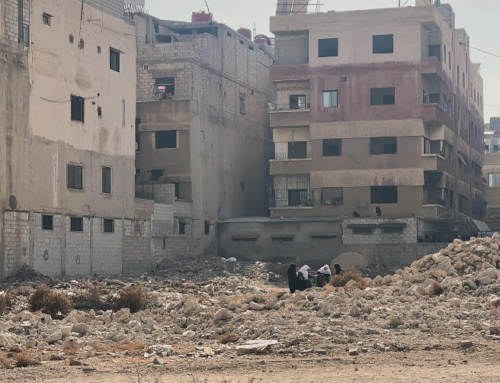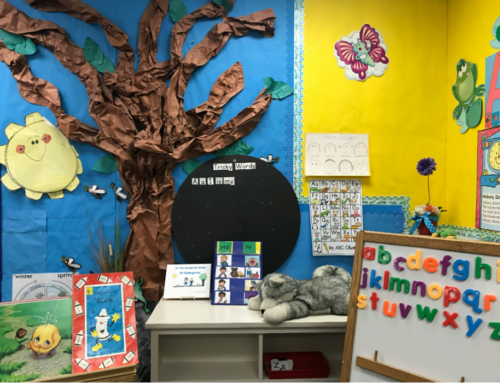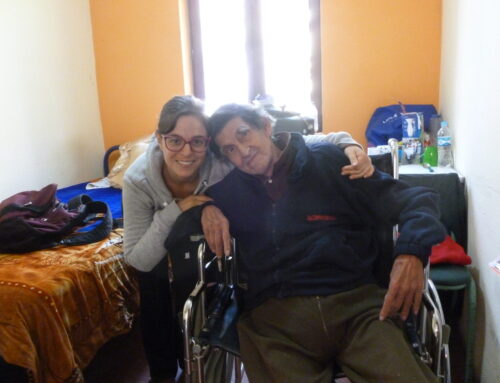I said to her, “I’m grateful to be here, but my life here is not like my life at home. I spent my time there working the nightshift with my mother and sister. Scrubbing toilets. I feel guilty because I could and should be working to improve my family’s financial standing. Instead, I am here.”
That was my response one chilly January morning when my academic advisor, Emily, asked me a seemingly innocuous question, “How was your winter vacation?”
In this interaction, feelings that I had carried silently since my start at Oregon University’s Master’s in Applied Anthropology program, surfaced. I said that I often felt out of place. Not only was I the first and only Deferred Action for Childhood Arrivals (DACA) beneficiary in the program, but my participation meant that my family still had to work multiple jobs just to make ends meet. I felt responsible that for the past five years my mother and sister had taken on extra (financial) responsibilities so that I could use my earnings to pay out-of-pocket tuition and dedicate my time to studying. I was–am–painfully caught between two worlds.
Her kindly delivered action-driven response was, “Write about it. Make your time here speak to these feelings and ideas.”
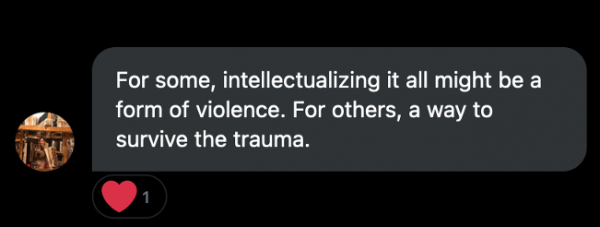
(A consejo from Emily.)
I am all too familiar with her type of consejo (advice) to reconcile these distances. Her counsel is similar to that of poet and scholar Gloria Anzaldúa (2005, 102), “We are all wounded but we can connect through the wound that’s alienated us from others. When the wound forms a cicatrize, the scar can become a bridge linking people split apart.” Documenting these experiences allows healing and bears witness to the realities of undocumentedness. Documenting undocumentedness, whether through poems, film, letters, sound, or more standard forms of academic writing is a way to offer testimonio. Claudia Cervantes-Soon best explains the significance of this practice:
Testimonios as a pedagogical practice fosters humanizing knowledge stemming from students’ and teachers’ own narratives of survival and resistance, and promotes theory that offers both a language of critique and a language of hope through the reclamation, transformation, and emancipation of their own lives and communities. (Cervantes-Soon 2012, 387)
I kept the symbiotic intermingling of lived-experience and theory close as I developed my research project and continued through my first year of graduate school. I thought more about what allowed me to pursue higher education. Navigating institutions as a person of color is challenging, doubly so when access to many financial resources depends upon acknowledged citizenship. Labels such as model immigrant, no doubt, play a role in bringing me to spaces I am worthy of or blessed to occupy. As one of few precariously documented people in graduate programs across the country, structurally, I am made to feel lucky. But as Harney and Moten (2013, 26) suggest, my place in the academy is an unwelcome necessity conditioned by the American university’s use of my labor, where I “can be in but not of.” This led me to question not only what kind of labor is valued (if at all) but whose, and I realized, my labor is actually our labor—a collective effort that includes my mother and sister. After all, it is because of their invisibilized “motherwork” (Collins 1994) that I can write essays late into the night while over 1,200 miles away, they sweep, mop, and vacuum the floors of corporate buildings. Documenting the experiences and stories shared by my mother and sister, led me to transform the intimate tracing of networks of care that sustain socially palatable immigrants such as myself into a body of knowledge. However, doing so was more difficult than I expected.
I constantly negotiate my place vis-à-vis the academy and the discipline of anthropology. I consider how my positionality and my work troubles the ideas of emic and etic perspectives that distinguish between the insider and the outsider. As I walk the halls of our department, I observe photographs of faculty conducting fieldwork in Guatemala, China, and Brazil (just to name a few). These images evince the history of sociocultural anthropology and its routinization of investigating the Other. Formal anthropological training lacks substantial methods for studying from the inside. Instead, this work tends to be done outside of the classroom: in intimate and informal settings, independently or through consejos at two in the morning, at Sunday night meals, by following social media threads, through texts by “fugitive anthropologists” (Berry et al. 2017), on hikes or trips to the beach, and through the work of (non)scholars outside of the domain of anthropology. Keeping in mind that anthropology requires participation in the ritual of citation, citing precariously documented anthropologists is a tall wall to jump because there are not many of us here. Weiss (2019) writes, “for minoritized scholars, there is a familiar erasure in the lack of space made for ideas not steeped in this lineage.” I often feel alone and frustrated. When I feel this way, I turn to poets, activists, and scholars whose works are in dialogue with my struggles. Other times, I return to my advisor’s consejo, “[Despair] does not tend to enable an ability to respond, to see need in others and think: ‘we have responsibility here’” (Yates-Doerr 2019, 145).
So it became apparent that this work would have an additional component: conceiving an anthropology about us, for us, by us.
Unlike my academic foremothers who traveled elsewhere, my research brought me home for fieldwork or “homework” (Visweswaran 1994) to the city of Phoenix, where the summer heat is as unforgiving as the state’s (immigration) politics. At home, my daily ongoings were met with a constant back-and-forth between being un hijo (son), hermano (brother), tio (uncle), activist, and antropólogo.
“¿Cuál es el significado de este trabajo? / What is the meaning of this work?” my mother would ask about our research.
I partially answered her question because it was one of those interrogations that necessitated more attention, “Estoy observando la dinámica de nuestra familia para comprender mejor la vida de las madres sin papeles. / I am observing the dynamics of our family to understand the lives of mothers without papers.”
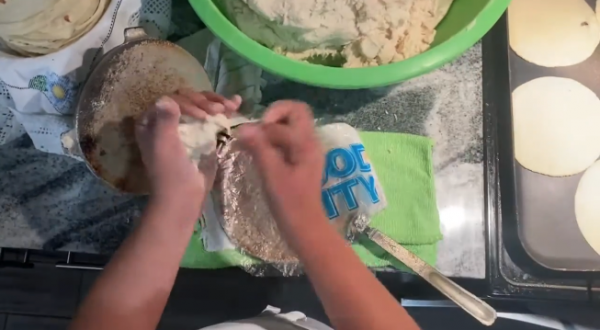
(Screengrab from our film, Manos a la Obra / La Obra de las Manos. To view visit: https://www.youtube.com/watch?v=_niZJWZq9ac&t=2s)
My mother and sister found it silly that I would photograph or capture videos of them making tortillas, cleaning toilet bowls, and running errands. When I would ask them questions about the work they did and how they envisioned and defined their behaviors, they were eager to share their ideas with me. They conceptualized their actions as mothering and sacrifice. But as enthusiastic as they appeared, they also vocalized skepticism:
“¿Pero si quieren saber de esto? ¿De nosotras? / But do they really want to know about this? About us?”
Their inquiry showed that they were interested in the value of our anthropology. Their doubts also served as reminders to me to think of them as active collaborators rather than passive participants and to revere them as theorists in their own right. Our intimate relationships with each other allowed us to think and learn together.
Stuck in traffic on our way to work and with the car air-conditioning saving us from the scorching heat my sister asked me about our future given the attacks on DACA by Trump and his administration:
“Yo tenía tantos sueños. Quería comprar una casa. ¿Qué sucede si los jueces deciden cancelarlo? ¿Ahora qué? ¿Y si nos deportan? No quiero ser ciudadana, solo quiero estar con mis hijos. / I had so many dreams. I wanted to buy a house. What happens if the judges decide to cancel it? Like what now? What if they deport us? I don’t want to be a [US] citizen, I just want to be with my kids.”
My sister was–and still is–willing to sacrifice a pathway to citizenship as well as the materialization of her dreams, in order to keep our family together. Centering their children in their decision-making, precariously documented mothers encounter situations where they are willing to forfeit recognized citizenship, positioning themselves in a contradictory condition of continuous uncertainty and deportability. In other words, to avoid immediate deportation and to keep their families intact, some women would trade off the possibility of legalization and accept the outcomes of illegality. My sister explained this to me as a state-imposed constraint:
“Nunca vas a vencer al gobierno. Todo es una trampa. / You are never going to beat the government. It’s all a trap.”
Sometimes anthropology feels like a trap.
With my camera, journal, and pen, I often found myself perplexed. Viewing undocumented life through the anthropological gaze stirred strong emotions. In some ways, I felt captive by the very notion that I was so interested in exploring. At times I was frustrated by my inability to step outside of this world that I inhibit. Anthropologizing can be its own form of hurt. During my homework and later in the analysis stage, my emotions magnified. I felt no amount of my ethnographic material or documentation (notes, footage, audio recordings, etc.) were sufficient to capture the cicatriz (scar) caused by crossing borders. What brought me solace in those moments was thinking about my mom and my sister. I thought about how they questioned the significance of our work and whether others really cared about them and our work. In those moments of doubt, I had to remind myself of the lessons they taught me: that an anthropology about us, for us, by us involves mothering and sacrifice. This anthropology is survival and resistance, it is a papercut cross-stitched on our brown contested bodies, a testimonio of our existence and humanity.
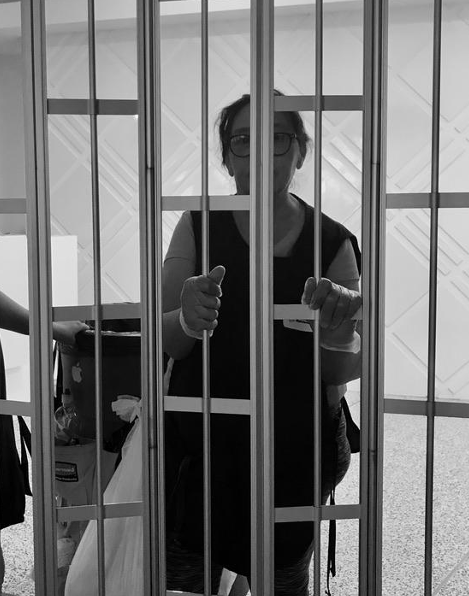
(My sister and mother at el trabajo.)
References
Anzaldúa, Gloria. 2005. “Let Us be the Healing of the Wound.” In One Wound for Another/Una Herida por Otra: Testmonios de Latin@s in the U.S. Through Cyberspace (11 de septiembre de 2001 – 11 de marzo de 2002), edited by Claire Joysmith and Clara Lomas, 93-102. Mexico City: Universidad Autónoma de México.
Berry, Maya J., Claudia Argüelles Chávez, Shanya Cordis, Sarah Ihmoud, and Elizabeth Velásquez Estrada. 2017. “Toward a Fugitive Anthropology: Gender, Race, and Violence in the Field.” Cultural Anthropology 32(4): 537–65.
Cervantes-Soon, Claudia G. 2012. “Testimonios of Life and Learning in the Borderlands: Subaltern Juárez Girls Speak.” Equity & Excellence in Education 45(3): 373–91.
Collins, Patricia Hill. 1994. “Shifting the Center: Race, Class, and Feminist Theorizing about Motherhood.” In Mothering: Ideology, Experience, and Agency, 45–65. New York: Routledge.
Harney, Stefano, and Fred Moten. 2013. The Undercommons: Fugitive Planning and Black Study. New York: Minor Compositions.
Weiss, Jules. 2018. “Citation is a Gift: “Punking” Accounting in #hautalk.” Footnotes. July 17, https://footnotesblog.com/2018/07/07/guest-post-citation-is-a-gift-punking-accounting-in-hautalk/
Visweswaran, Kamala. 1994. Fictions of Feminist Ethnography. Minneapolis: University of Minnesota Press.
Yates-Doerr, Emily. 2019. “Sick: The Deadly Logic of the Limited Good.” Medicine Anthropology Theory 6(1).
Cite as: Hurtado Moreno, Argenis. 2021. “An Anthropology about Us, for Us, by Us,” American Ethnologist website, 12 May 2021, https://americanethnologist.org/features/reflections/an-anthropology-about-us-for-us-by-us
Argenis Hurtado Moreno is a doctoral student in anthropology at Brown University and a predoctoral trainee at Brown’s Population Studies and Training Center. Through multimodal-multisensory ethnographic methods, his research explores topics of migration, kinship, care, and storytelling.
